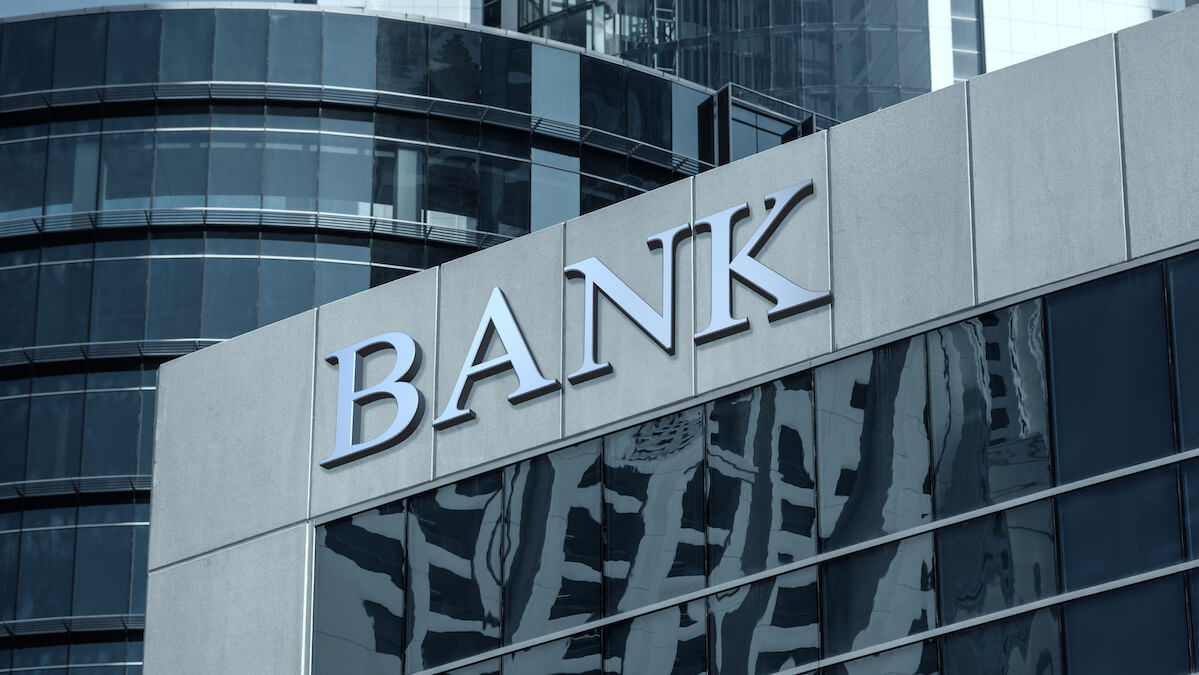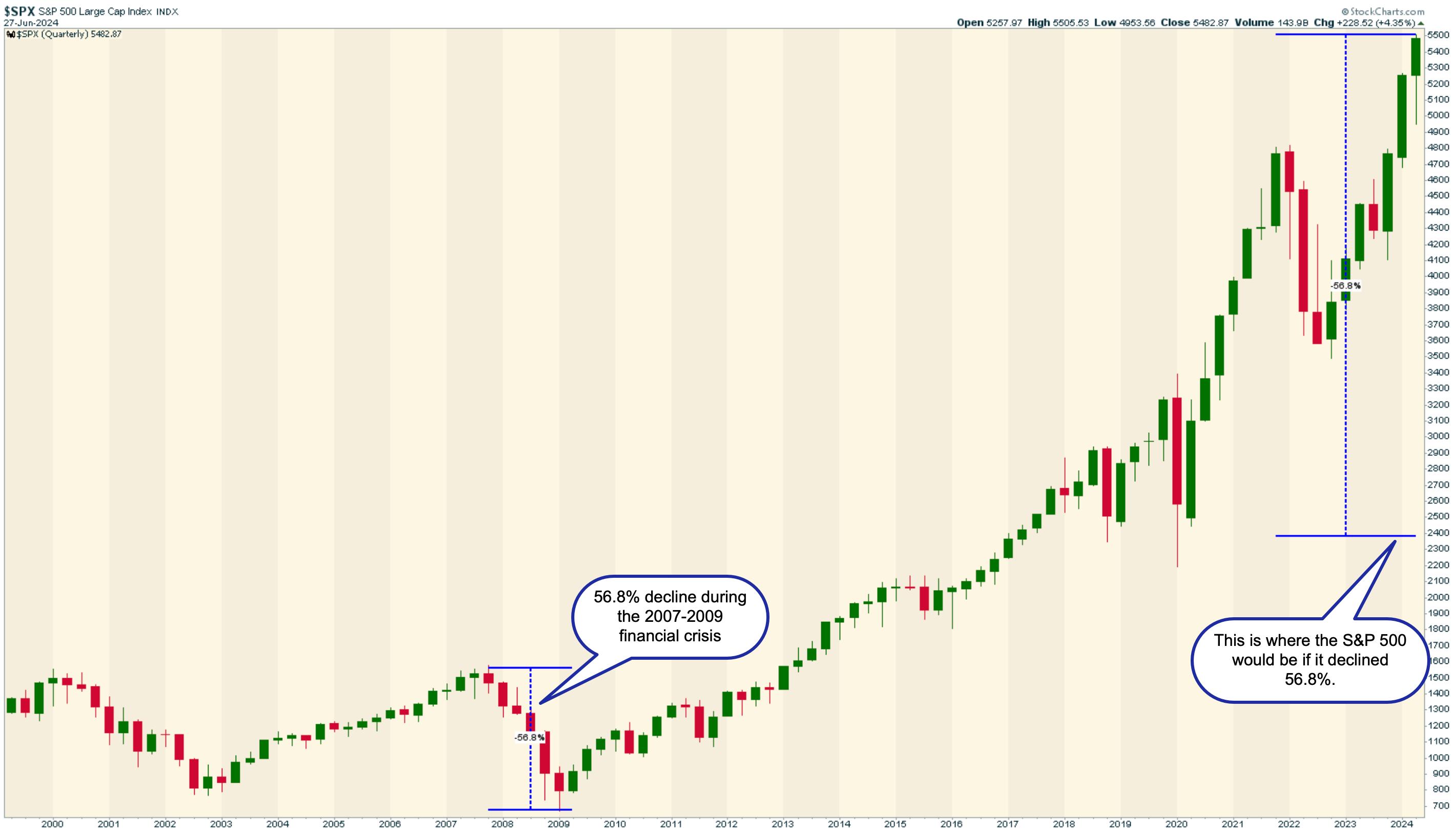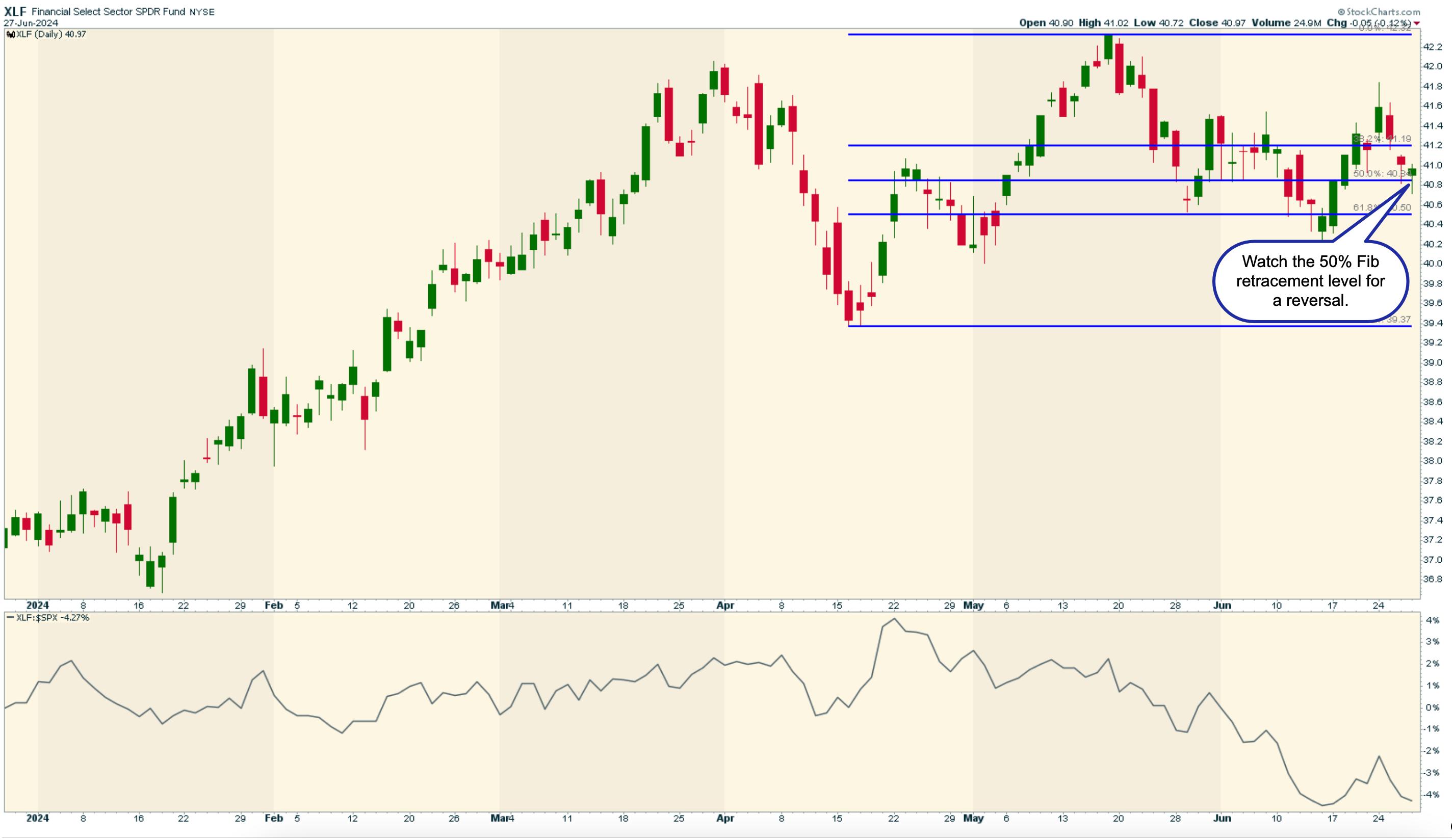KEY
TAKEAWAYS
- The 2024 financial institution stress outcomes present that every one collaborating banks are capable of stand up to an financial collapse
- Regardless of the banks passing the stress check, the XLF did not see a lot motion
- Search for XLF to reverse at its 50% Fibonacci retracement stage and begin gaining relative energy in opposition to the S&P 500

How properly can the nation’s greatest lenders maintain out in an financial disaster? The Federal Reserve’s annual financial institution stress check reveals the reply.
On Wednesday (June 26, 2024), the outcomes of the financial institution stress checks have been launched. All 31 collaborating banks, which included large banks, bank card corporations, and regional banks, handed the check. That is excellent news, particularly for individuals who personal large financial institution shares; you possibly can get slightly bonus in the way in which of dividends. However there’s extra to emphasize checks than dividend payouts. Let’s dive in.
What Are Financial institution Stress Checks?
The S&P 500 ($SPX) declined 56.8% throughout the 2007–2009 monetary disaster (see chart beneath). If the S&P 500 have been to say no that a lot once more, think about what that might do to your portfolio.

CHART 1. BANK STRESS TESTS WERE IMPLEMENTED TO AVOID ANOTHER FINANCIAL CRISIS. Throughout the 2007-2009 monetary disaster, the S&P 500 declined 56.8%. An identical proportion drop would carry the S&P 500 to round 2400.Chart supply: StockChart.com. For instructional functions.
To forestall such a state of affairs from occurring, the Federal Reserve (Fed) has been conducting stress checks on the nation’s greatest lenders yearly since 2011. The Fed units up a hypothetical state of affairs of a serious financial collapse and evaluates a financial institution’s steadiness sheet in opposition to this state of affairs. This determines if the financial institution has sufficient property to endure an financial collapse.
No two years are alike. Annually brings a brand new set of challenges. To accommodate these adjustments, the stress checks are modified. When the checks started in 2011, many banks failed. Over time, nonetheless, extra banks have proven their functionality to face up to potential financial stresses.
The check was based mostly on a move/fail mannequin within the early years. That is not the case. Banks should keep above a minimal capital ratio of 4.5% to move the check. As well as, every financial institution has a buffer added to that 4.5%, which varies from financial institution to financial institution relying on its hypothetical loss. In 2024, a 40% decline in business actual property costs, a 36% decline in dwelling costs, and a ten% unemployment charge have been factored into the check.
So, if all banks move the stress check, does it imply every little thing is hunky-dory? Banks have challenged the accuracy of those checks. After the 2024 check outcomes have been revealed, JPMorgan Chase (JPM) said that, based mostly on its estimates, losses ought to have been greater than what the check decided. A few large banks made related statements final yr.
One other level to bear in mind is that regardless that all banks handed the check, their capital ranges dropped by about 2.8 proportion factors. One purpose for that is the rise in bank card loans, which all buyers ought to carry on their radar.
Why Ought to Buyers Pay Consideration to the Stress Checks?
If the biggest lenders—JPM, Wells Fargo (WFC), Citigroup (C), Financial institution of America (BAC), Goldman Sachs (GS), and Morgan Stanley (MS)—move the check, their shares may development greater, and buyers may obtain dividend payouts. However that does not all the time occur.
For one instance, the Monetary Choose Sector SPDR ETF (XLF) did not transfer a lot the day after the check outcomes. Within the each day chart of XLF beneath, Fibonacci retracement ranges have been utilized to its most up-to-date upward transfer.

CHART 2. FINANCIAL SELECT SECTOR SPDR ETF (XLF) DAILY CHART. If XLF bounces off its 50% Fibonacci retracement stage and clears the 38.2% stage, XLF may development greater. It is best to verify the transfer with different indicators. For instance, if XLF’s relative efficiency in opposition to the S&P 500 improves, it will be one other checkmark to verify an upward development.Chart supply: StockCharts.com. For instructional functions.
XLF is hovering round its 50% retracement stage and can also be underperforming the S&P 500. There’s not rather a lot there to persuade anybody to go lengthy XLF, however that might change. If XLF reversed on the 50% stage, moved greater, and cleared the 38.2% stage, that could be a great time to lock in some positions. If XLF’s relative efficiency in opposition to the S&P 500 improved, that might be additional affirmation that XLF may transfer greater.
The Backside Line
Nothing is assured within the inventory market, however financial institution stress checks point out the larger financial image. It is also comforting to know that large lenders will probably endure a monetary shock of a giant magnitude. And for those who personal financial institution shares in your portfolio, a dividend payout might be one thing to sit up for, though it could take a few months earlier than it reveals up.
Disclaimer: This weblog is for instructional functions solely and shouldn’t be construed as monetary recommendation. The concepts and techniques ought to by no means be used with out first assessing your personal private and monetary state of affairs, or with out consulting a monetary skilled.

Jayanthi Gopalakrishnan is Director of Website Content material at StockCharts.com. She spends her time arising with content material methods, delivering content material to teach merchants and buyers, and discovering methods to make technical evaluation enjoyable. Jayanthi was Managing Editor at T3 Customized, a content material advertising company for monetary manufacturers. Previous to that, she was Managing Editor of Technical Evaluation of Shares & Commodities journal for 15+ years.
Be taught Extra

